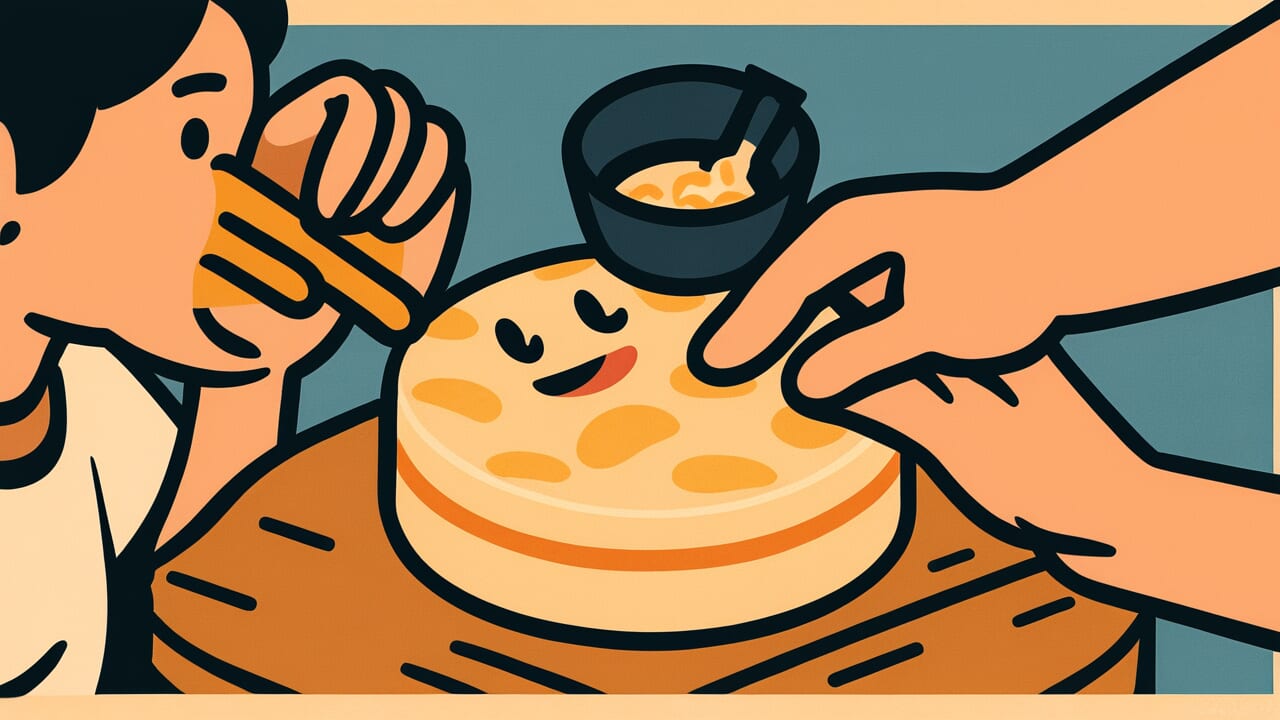How to Read “Try eating your neighbor’s rice cake too”
となりのもちもくってみよ
Meaning of “Try eating your neighbor’s rice cake too”
This proverb teaches that you can’t truly judge something until you actually try it yourself. Even if you think your own way or possessions are the best, experiencing what others have often brings unexpected discoveries.
People use this saying when someone stubbornly sticks to their own methods. It’s also used when someone judges others’ things without actually trying them.
Before deciding “our way is the best,” this proverb reminds us to actually experience other options.
The reason this expression matters is simple. People naturally become attached to their own experiences and possessions. They easily assume these are the best.
But without actual comparison, you can’t see true value. This lesson still applies today in many situations. It applies to choosing products or deciding on work methods.
The wisdom here is about empiricism. You can only make accurate judgments after setting aside preconceptions and actually trying things yourself.
Origin and Etymology
No clear documentary records show the exact origin of this proverb. However, the structure of the phrase reveals an interesting background.
Let’s focus on the expression “neighbor’s rice cake.” Mochi holds a special place in Japanese food culture. It was a luxury food eaten on special occasions. It was essential for New Year’s and celebrations.
So the neighbor’s mochi wasn’t just everyday food. It represented that household’s special dish.
The phrase “try eating” is also suggestive. It doesn’t just say “look at it.” It says “try eating it.” This means there’s value you can only understand by actually tasting it, not just observing from outside.
You can’t judge mochi’s quality just by looking. The taste changes greatly depending on rice quality, pounding method, and water amount.
During the Edo period, the custom of making mochi at home became widespread. Each household had its own unique way of making it. The flavors surely differed.
You might think your family’s mochi is the best. But actually eating your neighbor’s mochi might bring surprising discoveries.
This proverb likely emerged from such lived experiences. It represents the wisdom of Japanese people who value experience.
Usage Examples
- If you’re unsure about introducing new software, try eating your neighbor’s rice cake too—you should try the trial version first
- Don’t judge by reputation alone; as they say, try eating your neighbor’s rice cake too, so let’s actually visit that shop
Universal Wisdom
Humans have a tendency to believe that what they’re familiar with is best. This brings psychological stability. Believing your choices are correct frees you from anxiety and doubt.
However, this mental mechanism also carries the danger of narrowing our perspective.
“Try eating your neighbor’s rice cake too” has been passed down for generations. It likely served as a warning against this human tendency.
We unknowingly shut ourselves into our own world. We assume only our methods, our tastes, and our ways of thinking are correct. We end up excluding other possibilities.
The deep wisdom of this proverb lies in explaining the value of comparison. When you only know your own things, you can’t actually judge whether they’re good or bad.
Only by comparing with others can you see the true value of what you have.
Our ancestors saw this truth through experience. They understood that some insights can only be gained by breaking fixed ideas and actually trying things.
This wasn’t just encouraging curiosity. It was practical wisdom for making better judgments.
To make the best choices in life, you need courage. Courage to break out of your shell and look toward other possibilities.
When AI Hears This
If your own rice cake is delicious enough, it seems unnecessary to try your neighbor’s. But from an information theory perspective, this seemingly wasteful action has deep meaning.
Imagine you have ten chances to eat rice cake. You know your own rice cake’s satisfaction level is 70 points. If you use all remaining chances on your own rice cake, that’s 700 points total.
But if you try your neighbor’s rice cake once and it scores 90 points, the remaining nine times give you 810 points. One exploration cost changes the subsequent utilization effect significantly.
What’s interesting here is the timing of trying. Research on the “multi-armed bandit problem” in machine learning proves mathematically something important. The more options you have and the more remaining trials, the higher the value of exploration.
The reason to challenge new things in the first half of life isn’t just intuitive. It’s probabilistically correct.
What’s even more important is this. Even if your neighbor’s rice cake is worse than yours, that information itself has value.
If you can confirm that your 70-point option isn’t bad, you can use the remaining trials without hesitation. Exploration isn’t just about finding better options. It’s also about knowing the relative value of your current option.
Lessons for Today
What this proverb teaches modern you is the value of experience. In today’s information-flooded era, we tend to judge based only on reviews and reputation.
But true quality can’t be known unless you actually try it yourself.
The same applies to work methods, lifestyle habits, and human relationships. Even if you think “the current way is good enough,” actually trying other methods might bring unexpected discoveries.
That’s a chance to expand your possibilities.
What matters is the courage to try without fearing failure. Of course, after trying, you might find your original way was better after all. That’s perfectly fine.
Because at that point, through the experience of comparison, you’ll have gained confidence in your choice.
Let go of preconceptions and keep your heart open to new experiences. That’s the warm yet powerful message this proverb gives to you living in modern times.
Your world can become richer by taking just one step forward.



Comments